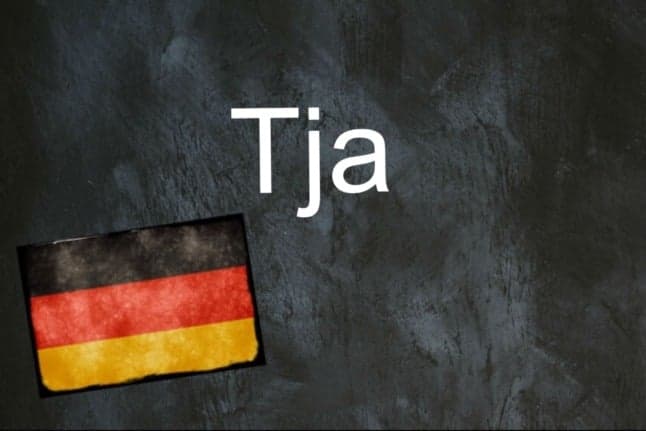German word of the day: Tja

This useful German interjection will help you blend in with locals and make your conversation sound more natural than ever.
Tja is one of the shortest but most versatile words in the German language. Close to the English ‘well’, you will hear it littered through almost every conversation.
Tja is sometimes described as a vocalised sigh or shrug, and is often used at the start of a sentence before you launch into the real meat of what you want to say.
Using this at the beginning of a statement sets the tone for your conversation, suggesting a slight sense of annoyance or resignation. Although the closest translation of tja in English is ‘well’, be careful using it too often, as it can have quite negative connotations in German.
Tja can also be a way of sounding trotzig, or contrary. If someone asks you a question and you are about to give an answer they might not expect, you may begin your response with tja to let them know you are going to challenge their expectations - in this case it would mean something along the lines of ‘well, actually’.
The word tja is highly colloquial, so you will almost never come across it written down or in formal settings. Nevertheless, it is probably one of the most used words in everyday speech.
There is really no hard and fast rule when it comes to German particles, and this applies to tja too. If you really want to get a sense of when to use tja in your spoken German, the only way to do so is to spend time with native German speakers and listen out for when the word pops up naturally.
READ ALSO: Das ist ja mal wichtig: The complete guide to German particles
There is a joke among German speakers that you could use tja to respond to any bad news, no matter how severe. The discovery of a missing ingredient for a recipe is just as likely to be met with a gentle tja as is the announcement of an apocalypse.
Examples:
Tja, was soll ich sagen?
Well, what can I say?
Hast du dich heute früh mit Julia getroffen? -Tja, wir wollten uns treffen, aber sie hatte zu viel zu tun.
Did you meet up with Julia this morning? - Well, we wanted to but she was too busy.
Comments
See Also
Tja is one of the shortest but most versatile words in the German language. Close to the English ‘well’, you will hear it littered through almost every conversation.
Tja is sometimes described as a vocalised sigh or shrug, and is often used at the start of a sentence before you launch into the real meat of what you want to say.
Using this at the beginning of a statement sets the tone for your conversation, suggesting a slight sense of annoyance or resignation. Although the closest translation of tja in English is ‘well’, be careful using it too often, as it can have quite negative connotations in German.
Tja can also be a way of sounding trotzig, or contrary. If someone asks you a question and you are about to give an answer they might not expect, you may begin your response with tja to let them know you are going to challenge their expectations - in this case it would mean something along the lines of ‘well, actually’.
The word tja is highly colloquial, so you will almost never come across it written down or in formal settings. Nevertheless, it is probably one of the most used words in everyday speech.
There is really no hard and fast rule when it comes to German particles, and this applies to tja too. If you really want to get a sense of when to use tja in your spoken German, the only way to do so is to spend time with native German speakers and listen out for when the word pops up naturally.
READ ALSO: Das ist ja mal wichtig: The complete guide to German particles
There is a joke among German speakers that you could use tja to respond to any bad news, no matter how severe. The discovery of a missing ingredient for a recipe is just as likely to be met with a gentle tja as is the announcement of an apocalypse.
Examples:
Tja, was soll ich sagen?
Well, what can I say?
Hast du dich heute früh mit Julia getroffen? -Tja, wir wollten uns treffen, aber sie hatte zu viel zu tun.
Did you meet up with Julia this morning? - Well, we wanted to but she was too busy.
Join the conversation in our comments section below. Share your own views and experience and if you have a question or suggestion for our journalists then email us at [email protected].
Please keep comments civil, constructive and on topic – and make sure to read our terms of use before getting involved.
Please log in here to leave a comment.